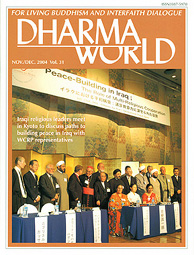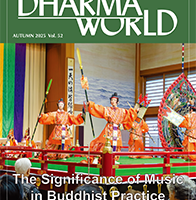November-December 2004, Volume 31(PDF)
Peace Building Through Multi-Religious Cooperation
“Simply Ordinary Men” by Yoshiaki Sanada
Yoshiaki Sanada is a professor of law who has taught Western legal history and comparative law based on Islamic law at Chuo University’s School of Law in Tokyo. Since 1994 he has been a guest professor at the Institute of Comparative Law of the China University of Politics and Law in Beijing. He is also director of the Peace Research Institute, which is affiliated with the Japanese Committee of the World Conference of Religions for Peace.
Essays
Interfaith Understanding and Collaboration by Son Soubert
All religious faith is the result of an acknowledgment that something exists beyond our physical longing, life, and understanding.
H.E. Son Soubert is a member of the Constitutional Council of the Kingdom of Cambodia, appointed by His Majesty King Norodom Sihanouk, and is a professor in the Faculty of Archaeology of the Royal University of Fine Arts, Phnom Penh. During 1993–98, he served as second vice-president of the National Assembly (parliament) and in March 1998, he became president of the Son Sann Party, elected by the congress of the party.
Faith and Interfaith in Britain, 2004 by Richard Boeke
A leading advocate of interfaith dialogue calls on us to develop a sense of oneness with all that lives, taking the first step in a spiritual life.
Richard Boeke is honorary secretary of the World Congress of Faiths, which is now based at the London Interfaith Centre . After studies at the Harvard Center for World Religions, in 1959 he entered the Unitarian Universalist ministry. Dr. Boeke served as minister of the Unitarian Universalist Church of Berkeley, California, and in 1995 moved to England, becoming minister of the Unitarian Church of Seven Oaks and serving as secretary to the International Council of Unitarians and Universalists.
Buddhism and Forgiveness by Joseph S. O’Leary
Christianity is based on the event of divine forgiveness. In some early Buddhist texts, the emphasis falls not on forgiving, but on the foolishness of taking offense in the first place.
Joseph S. O’Leary studied literature, philosophy, and theology in Maynooth College, Ireland, and in Rome and Paris. Resident in Japan since 1983, he has participated in research at the Nanzan Institute for Religion and Culture, and lectures in the Department of English Literature at Sophia University. His publications include Questioning Back: The Overcoming of Metaphysics in Christian Tradition (Minneapolis, 1985) and Religious Pluralism and Christian Truth (Edinburgh, 1996). This article is adapted from his article that appeared under the same title in the Japan Mission Journal (Spring 2002, Vol. 56, No. 1).
Reflections
All of Us, Everywhere, Are Life’s Children by Nichiko Niwano
This concept, Rev. Niwano says, is itself the invaluable spirit of living in a world of coexistence. The following is the text of the address delivered by Rev. Niwano to the 43rd General Assembly of the Unitarian Universalist Association (UUA) held in Long Beach, California, on June 25.
Nichiko Niwano is president of Rissho Kosei-kai and the Niwano Peace Foundation, a president of the World Conference of Religions for Peace (WCRP), and chairman of the Japanese Association of Religious Organizations.
Human Beings Cannot Live Alone by Nikkyo Niwano
This essay is part of a continuing series of translations from a volume of inspirational writings by the late founder of Rissho Kosei-kai. DHARMA WORLD will continue to publish these essays because of their lasting value as guidance for the practice of one’s daily faith.
Nikkyo Niwano, the late founder of Rissho Kosei-kai, was an honorary president of the World Conference of Religions for Peace (WCRP) and was honorary chairman of Shinshuren (Federation of New Religious Organizations of Japan) at the time of his death in October 1999.
Report
The Importance of the Ninth Lotus Sutra Conference by Christopher Rupp
Christopher Rupp is a second-year graduate student in the Department of Religious Studies at the University of Pittsburgh. His work focuses on East Asian Buddhism in the medieval period, particularly late Heian and early Kamakura Japan.
The Stories of the Lotus Sutra
Two Nuns: Mahaprajapati and Yashodhara by Gene Reeves
By admitting women into the Sangha as nuns, the teaching that all are equal won out, but the reality of the monks’ sexual desire and of consequent disrespect for women did not go away.
Gene Reeves is currently studying, teaching, and writing on Buddhism in Tokyo. A consultant and teacher at Rissho Kosei-kai, he was recently a research fellow at Rikkyo University. Before coming to Japan in 1989, Dr. Reeves was the dean of Meadville/Lombard Theological School and professorial lecturer in the Divinity School of the University of Chicago.
Buddhist Living
Giving Thanks Today for the Trials of Yesterday by Yoshie Sugawara
A member who is a working wife and mother learns from her chapter leader that she herself was partly responsible for problems not only with her teenage son, but also with her husband.
Yoshie Sugawara is a member of the Toyama Branch of Rissho Kosei-kai.
Gotama Buddha (69)
The Final Rites for the Buddha by Hajime Nakamura
Both Sanskrit and Pali texts mention that perfumes, garlands, and musical instruments were brought, suggesting that these were standard items at funerals.
The late Dr. Hajime Nakamura, an authority on Indian philosophy, was president of the Eastern Institute in Tokyo and a professor emeritus of the University of Tokyo at the time of his death in October 1999. This ongoing series is a translation of Gotama Buddha, vol. 2 (Tokyo: Shunjusha, 1992).
The Threefold Lotus Sutra: A Modern Commentary (79)
The Sutra of the Lotus Flower of the Wonderful Law
Chapter 8: The Five Hundred Disciples Receive the Prediction of Their Destiny (3) by Nikkyo Niwano
This is the seventy-eighth installment of a detailed commentary on the Threefold Lotus Sutra by the late founder of Rissho Kosei-kai, Rev. Nikkyo Niwano.























































































